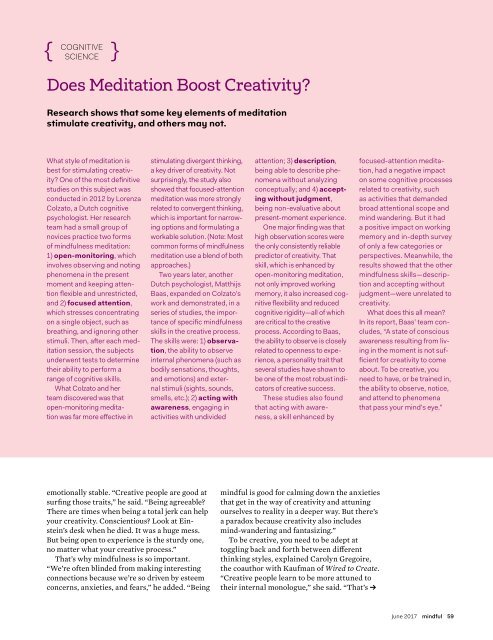Mindful June 2017
Create successful ePaper yourself
Turn your PDF publications into a flip-book with our unique Google optimized e-Paper software.
COGNITIVE<br />
{ }<br />
SCIENCE<br />
Does Meditation Boost Creativity?<br />
Research shows that some key elements of meditation<br />
stimulate creativity, and others may not.<br />
What style of meditation is<br />
best for stimulating creativity?<br />
One of the most definitive<br />
studies on this subject was<br />
conducted in 2012 by Lorenza<br />
Colzato, a Dutch cognitive<br />
psychologist. Her research<br />
team had a small group of<br />
novices practice two forms<br />
of mindfulness meditation:<br />
1) open-monitoring, which<br />
involves observing and noting<br />
phenomena in the present<br />
moment and keeping attention<br />
flexible and unrestricted,<br />
and 2) focused attention,<br />
which stresses concentrating<br />
on a single object, such as<br />
breathing, and ignoring other<br />
stimuli. Then, after each meditation<br />
session, the subjects<br />
underwent tests to determine<br />
their ability to perform a<br />
range of cognitive skills.<br />
What Colzato and her<br />
team discovered was that<br />
open-monitoring meditation<br />
was far more effective in<br />
stimulating divergent thinking,<br />
a key driver of creativity. Not<br />
surprisingly, the study also<br />
showed that focused-attention<br />
meditation was more strongly<br />
related to convergent thinking,<br />
which is important for narrowing<br />
options and formulating a<br />
workable solution. (Note: Most<br />
common forms of mindfulness<br />
meditation use a blend of both<br />
approaches.)<br />
Two years later, another<br />
Dutch psychologist, Matthijs<br />
Baas, expanded on Colzato’s<br />
work and demonstrated, in a<br />
series of studies, the importance<br />
of specific mindfulness<br />
skills in the creative process.<br />
The skills were: 1) observation,<br />
the ability to observe<br />
internal phenomena (such as<br />
bodily sensations, thoughts,<br />
and emotions) and external<br />
stimuli (sights, sounds,<br />
smells, etc.); 2) acting with<br />
awareness, engaging in<br />
activities with undivided<br />
attention; 3) description,<br />
being able to describe phenomena<br />
without analyzing<br />
conceptually; and 4) accepting<br />
without judgment,<br />
being non-evaluative about<br />
present-moment experience.<br />
One major finding was that<br />
high observation scores were<br />
the only consistently reliable<br />
predictor of creativity. That<br />
skill, which is enhanced by<br />
open-monitoring meditation,<br />
not only improved working<br />
memory, it also increased cognitive<br />
flexibility and reduced<br />
cognitive rigidity—all of which<br />
are critical to the creative<br />
process. According to Baas,<br />
the ability to observe is closely<br />
related to openness to experience,<br />
a personality trait that<br />
several studies have shown to<br />
be one of the most robust indicators<br />
of creative success.<br />
These studies also found<br />
that acting with awareness,<br />
a skill enhanced by<br />
focused-attention meditation,<br />
had a negative impact<br />
on some cognitive processes<br />
related to creativity, such<br />
as activities that demanded<br />
broad attentional scope and<br />
mind wandering. But it had<br />
a positive impact on working<br />
memory and in-depth survey<br />
of only a few categories or<br />
perspectives. Meanwhile, the<br />
results showed that the other<br />
mindfulness skills—description<br />
and accepting without<br />
judgment—were unrelated to<br />
creativity.<br />
What does this all mean?<br />
In its report, Baas’ team concludes,<br />
“A state of conscious<br />
awareness resulting from living<br />
in the moment is not sufficient<br />
for creativity to come<br />
about. To be creative, you<br />
need to have, or be trained in,<br />
the ability to observe, notice,<br />
and attend to phenomena<br />
that pass your mind’s eye.”<br />
emotionally stable. “Creative people are good at<br />
surfing those traits,” he said. “Being agreeable?<br />
There are times when being a total jerk can help<br />
your creativity. Conscientious? Look at Einstein’s<br />
desk when he died. It was a huge mess.<br />
But being open to experience is the sturdy one,<br />
no matter what your creative process.”<br />
That’s why mindfulness is so important.<br />
“We’re often blinded from making interesting<br />
connections because we’re so driven by esteem<br />
concerns, anxieties, and fears,” he added. “Being<br />
mindful is good for calming down the anxieties<br />
that get in the way of creativity and attuning<br />
ourselves to reality in a deeper way. But there’s<br />
a paradox because creativity also includes<br />
mind-wandering and fantasizing.”<br />
To be creative, you need to be adept at<br />
toggling back and forth between different<br />
thinking styles, explained Carolyn Gregoire,<br />
the coauthor with Kaufman of Wired to Create.<br />
“Creative people learn to be more attuned to<br />
their internal monologue,” she said. “That’s →<br />
<strong>June</strong> <strong>2017</strong> mindful 59


